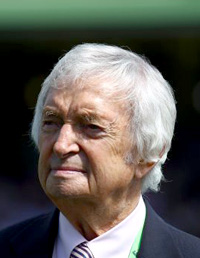Cricket Australia Chairman Wally Edwards has paid tribute to former Australian captain Richie Benaud, who has died aged 84.
“Our country has lost a national treasure,” Mr Edwards said.
“After Don Bradman, there has been no Australian player more famous or more influential than Richie Benaud.
“Richie stood at the top of the game throughout his rich life, first as a record-breaking leg-spinner and captain, and then as cricket’s most famous broadcaster who became the iconic voice of our summer.
“He was an important influence in the formation of Kerry Packer’s World Series Cricket in 1977, a climactic event at the time but one which has left a lasting, positive influence on the game.
“He became a favorite of the masses as the long-serving anchor of the Nine Network’s cricket coverage in Australia and the BBC and Channel 4 in the UK. His crisp style, dry humor, understated delivery, and array of jackets made him one of the most loved personalities on television as he brought cricket to the lives of millions.
“Away from the camera he was a leader, mentor and positive influencer of an extraordinary number of cricketers.
“And despite his role as the treasured grandfather of the game, he remained deeply in touch with modern developments, embracing Twenty20 when others of older eras shunned it.
“His passing today marks a profound loss to our nation. Australian cricket and the game’s legions of fans extend deepest sympathies to Richie’s wife Daphne, brother John and the entire Benaud family at this sad time.”
As a player Richie Benaud started out as an attacking batsman and accurate slow bowler, before growing into the first Test all-rounder to reach 200 wickets and 2000 runs. But there was much more to his life than on-field deeds.
Benaud was working as a professional journalist when he was appointed captain of Australia for the first time in the 1958-59 series against England. He led from the front with 31 wickets at 18 in the 4-0 victory and held the job until his final series in 1963-64.
His most memorable day came when Australia and the West Indies shared Test cricket’s first tie at the Gabba in 1960-61. At tea, when pressed by selector Don Bradman, Benaud said: “We’re going for a win, of course.” The result and the gripping series helped revitalise the Test format after a sombre period in the 1950s.
Australia never lost a series when Benaud was in charge, thanks to his aggressive, thoughtful leadership, which included a knack for switching the field shortly before a breakthrough. He was in charge for 28 games, which was then a record, and was the country’s first skipper to win a series in Pakistan.
Born in Penrith in 1930, he was named Richard but was always Richie.
The start of his career, when he was seen more as a batsman, was slow as he managed 868 runs at 28.66 in his opening 27 Tests and 73 wickets. But just like Steve Waugh decades later, Benaud transformed himself from a useful player into a heroic performer once handed senior duties and the captaincy. In his next 23 Tests, Benaud grabbed 131 victims at 22.66 and many more valuable runs.
Bill O’Reilly, the great leg-spinner, had helped improve Benaud’s tight, side-on bowling by telling him to focus on leg-breaks before the other variations. Benaud was hugely successful on the 1956 trip to India, capturing three five-wicket hauls, and turned the 1961 Old Trafford Test by going around the wicket and aiming for the footmarks. Twenty-five balls later he had 5 for 13 and Australia were toasting a satisfying victory.
Benaud’s bowling was hindered by a painful shoulder injury suffered on that 1961 tour, but he still managed 29 wickets in his final two campaigns.
A magnetic performer, he bowled with the top buttons of his shirt undone, and was a pioneer of the exuberant celebration, rushing up to his team-mates after taking a wicket.
Benaud was made an Officer of the Order of the British Empire (OBE) in 1961 for services to cricket and was inducted into the Sport Australia Hall of Fame in 1985. In 2007, he was inducted into the Australian Cricket Hall of Fame at the Allan Border Medal presentation in Melbourne and two years later was inducted into the ICC Cricket Hall of Fame.




